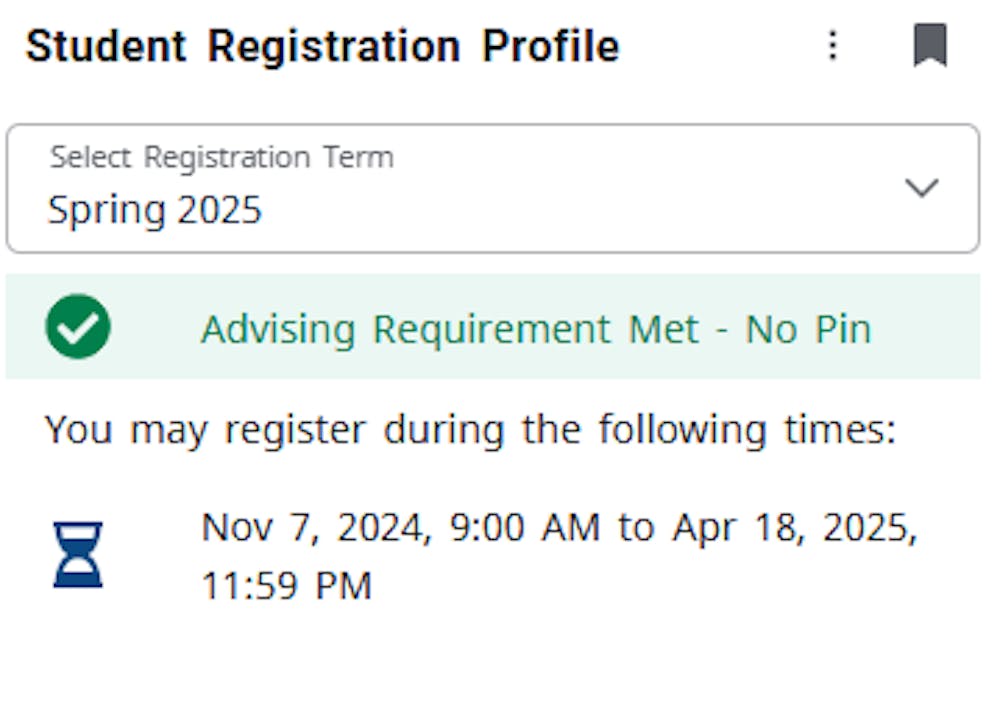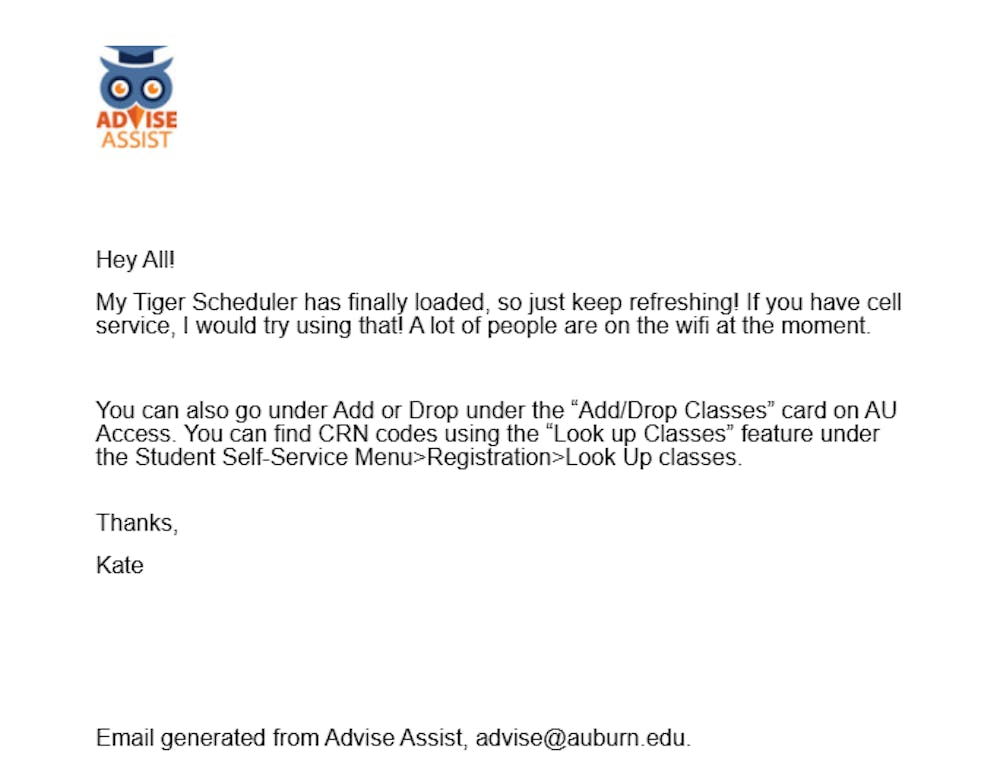Auburn’s trend for the past few years has been enlargement. Internet usage is constantly advancing with new efforts to become digitally streamlined daily. Not only do students struggle with the lack of physical space but they lack digital space in the age of advancement as well. With all this progress, however, some digital spaces still aren’t making ends meet.
This could be due to the lack of bandwidth at the university, which is causing crashes among important sites that students need.
Bandwidth is the capacity of a network to transmit data in a timely manner. Having high bandwidth networks allow for the transmittal of more information than that of a lower bandwidth given the same amount of time. Internet service and experience can also be affected by having high or low bandwidth.
One of the most important sites that students need is Tiger Scheduler, which is used to register for classes each semester. Tiger Scheduler frequently has issues with crashes due to the abundance of people using the site, which could be a bandwidth issue.
When students register for their classes, they occasionally have a requirement to meet with their advisor for a check-off, a pin number or for advice. Some advisors use this time to pre-register students for necessary classes with limited spots. This preregistration process is typically done for seniors.
Auburn students began using Tiger Scheduler in the fall of 2022. When registering in previous years, students would have to use the add-drop feature found on AU Access and enter CRN numbers for classes, which is even more time consuming and tedious.
Karen Battye, registrar at Auburn explained that registration occurs over seven academic days, in which students receive a time slot.
"In total these sixty-three time ticket windows must be divided as evenly as possible across the entire student population based on the registration framework outlined by Auburn administration," Battye said. "The Office of the Registrar works to test the number of students within each time ticket window to ensure that the registration schedule meets all requirements and the total number of students within each window is as uniform as possible."
When registration is upcoming, Battye explained that the Office of Registrar conducts tests to ensure that all students are eligible to register at their specific date and time. When looking to register, Battye recommended that students "[R]egister on a laptop or desktop device in a secure area with reliable internet/Wi-Fi connection; regardless of whether that connection is located on-campus or off-campus."
Tiger Scheduler does experience issues, it typically crashes, or has a waiting time to enter the site, each semester when students register. The typical crash shown is an "404 Not Found” or “500 Internal Server Error” two of the hardest and most vague issues to solve when it comes to websites. However, it’s important to note that these errors aren’t shown to every student.
404 and 500 are difficult errors because when they're displayed, there's usually no clear indication of what is causing the error. Error 404 is typically displayed when transitioning data to another page and the URL that specifies which part of the page cannot be found. Error 500 is displayed when too many requests are being made on a site that cannot be fulfilled.
Both of these errors may stem from a local issue, such as bandwidth capacity, or a server error which is caused by a computer not properly communicating with the server a website is on.
When these errors are shown, the Office of Information Technology has to find a solution so students can access a seat in their preferred or required classes. However, it doesn’t always happen in a timely manner. Some students that register early in the day have issues, and it can take up to an hour to get into Tiger Scheduler and register.
This could be due to the abundance of students with the same registration date and time.
Most registration times fall within the school day, which could also be a reason as to why Tiger Scheduler consistently crashes. Students on campus, professors and employees are all on the network during regular campus hours. These registration times don’t prioritize the student and also don't allow for advisors to be prepared when registration week begins.

Student registration tickets shown on AU Access. | Contributed by Brychelle Brooks
Advisors are not to blame, though students are quick to blame all Tiger Scheduler issues on them. However, advisors also deal with the Tiger Scheduler outage on their end. Most times, they’re also waiting on OIT for a solution to the problem.
During these outages, advisors will have an automatic reply to some questions, and some will find the time to send a mass email in which they explain that they can also not do anything about the outage. However, there are other things that can be attempted for registration.

Email from an advisor concerning issues with Tiger Scheduler. | Contributed by Brychelle Brooks

Email from an advisor concerning issues with Tiger Scheduler and the other options that students can use. | Contributed by Brychelle Brooks
Some of these outages aren't abundant just during registration weeks but also during exam periods. Students find themselves commonly struggling with keeping a connection during finals, which could be due to the amount of students on campus at this time.
Jim O'Connor, Vice President of Information Technology explained that the amount of people on Auburn's network is likely the cause of the issues with connections during this time, however bandwidth of the servers might not be the source.
Auburn recently switched to a new Wi-Fi for the university area called eduroam, which should be working faster and better for students and faculty on university networks.
Brad Garnett, Network Manager for the Office of Information Technology explained that in fall 2024, AU_Wi-Fi reached "capacity," which means that the network is unable to handle the amount of users on the network.
"[Last fall] sometime around the 10 o'clock time frame, we got alerts that our wireless infrastructure was at an issue," Garnett said. "Long story short, we identified we has a capacity issue that just tipped the point."
Garnett further explained that OIT is working with this new Wi-Fi network, his team is working to expand the capacity of users that are supported on eduroam. The current number of controllers, which connect wireless connections to users, is 12; which has been upped from the past nine.
In adding these controllers, capacity has expanded, therefore Auburn's bandwidth shouldn't be overflowing anytime soon. Garnett and his team are working with a "4.5% increase in students from 2023-24 and [we] are assuming a similar increase for next fall," to properly install more wireless access points across campus.
Garnett and his team are also working with each building as a part of a bigger project. They're making adjustments to where wireless access points are in classrooms and other parts of buildings based on the room shape and how things are furnished.
The "slower" network connection experienced this year throughout campus might not only be to blame on AU_WiFi reaching capacity. The amount of devices in one room might also be to blame. Bringing in more than three devices that connect wirelessly per person in one room is harmful to the strength of a connection, according to Garnett.
Overall, the university is working with almost a 100% gigabit difference in connection compared to home connections that companies like AT&T provide. Just like the rest of the university, OIT is working to provide students with the best experience possible, and that starts at the root with internet connection.
OIT is doing their best to avoid having any major updates in the early August to mid September date range, just because of the influx of students using Auburn's networks. Garnett explained that his team is constantly monitoring the network, and that finding a root to issues like these aren't always easy. However, student calls and feedback always help them find ways to improve connection.
"That's our goal, honestly, number one, [the] student experience," Garnett said. "We want to hear from you guys, [students], it helps us know where we need to improve."
Do you like this story? The Plainsman doesn't accept money from tuition or student fees, and we don't charge a subscription fee. But you can donate to support The Plainsman.

Brychelle Brooks, senior majoring in public and professional writing with a minor in information systems, has been with The Auburn Plainsman since August 2023. She previously served as the Campus Reporter, Opinion Editor and Newsletter Editor. She is currently serving as the Editor-in-Chief.
Sami Grace Donnelly, Emily May, Piper Bosart, Brychelle Brooks, Madison Champion, Luca Flores, Michaela Yielding, Rachel Swan, Grace Heim, Ella Walton, Sam Vise, Chase Morgese, Emma Miller.





